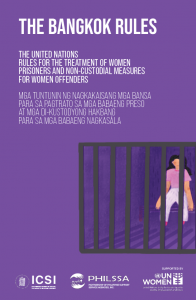 Considering the increasing number of women and girls placed in custodial facilities like jails and prisons in many parts of the world, the United Nations adopted in December 2010 the Rules for the Treatment of Women Prisoners and Non-Custodial Measures for Women Offenders. Thailand led the promotion and reinforcement of this set of standards to the recognition of the UN, thus the alternate name Bangkok Rules.
Considering the increasing number of women and girls placed in custodial facilities like jails and prisons in many parts of the world, the United Nations adopted in December 2010 the Rules for the Treatment of Women Prisoners and Non-Custodial Measures for Women Offenders. Thailand led the promotion and reinforcement of this set of standards to the recognition of the UN, thus the alternate name Bangkok Rules.
With the aim of addressing gender-based discrimination in the criminal justice system, the 70 rules cover various concerns pertaining to the distinct needs and experiences of women in conflict with the law, specifically those who must stay in a jail during their trial or who have to serve their sentence in a prison. The rules aim to ensure that women receive humane treatment from the time of their admission to their reintegration to society. Moreover, the Bangkok Rules also advocate for the use of non-custodial alternatives to imprisonment that can be made available to women.
The provisions of the Bangkok Rules are divided into four main sections:
- Section I (Rules 1-39) provides detailed guidance for managing institutions and addressing issues such as those related to health care services, mental and reproductive health, safety and security, contact with children, and treatment of juvenile female prisoners.
- Section II (Rules 40-56) enumerates the rules to be observed for special categories of prisoners such as those serving their sentence, pregnant and breastfeeding mothers, minorities and indigenous peoples, and women awaiting trial.
- Under Section III (Rules 57-66) are the requirements for non-custodial measures or alternatives to imprisonment for women offenders with caring responsibilities or with substance abuse-related conditions best addressed through community-based interventions, for example.
- Section IV (Rules 67-70) emphasizes the importance of research, planning, evaluation, public awareness-raising and sharing of information in the development of effective and appropriate policies for female offenders.
The Bangkok Rules commit states, including the Philippines, to reduce the incarceration of women, and if they are already in prison, protect their rights and uphold their dignity.
ABOUT THIS PUBLICATION
This publication was produced under the Delivery of Women’s Legal Literacy and Access to Justice Services in the Philippines Project of the Partnership of Philippine Support Service Agencies (PHILSSA), an implementing partner of UN Women.
The John J. Carroll Institute on Church and Social Issues (ICSI) supervised the development of this publication. Multi-awarded author and poet, Roberto Añonuevo, translated the text into Filipino. All illustrations are by Queenie Anne Umadhay.

